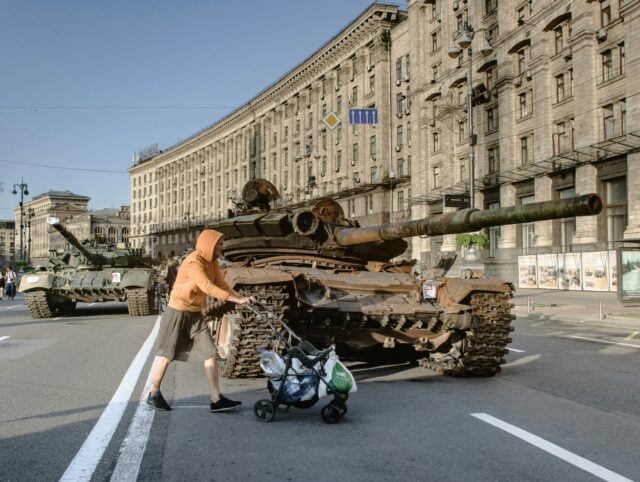Russia has massed large numbers of troops back on its own territory in a bid to control and reverse Ukraine’s gains into Russian Kursk, the counter offensive to the counter offensive now reportedly underway.
Ukraine threw Russia a curved ball earlier this year when it pivoted from occasional point-scoring incursions into Russian territory to a full-on bid to capture and occupy Russian territory, a tit-for-tat for Ukrainian land occupied by Moscow, and quite probably a bargaining chip for peace negotiations, should they come. While fighting grinds on, Russia now appears to be making a serious bid to retake its United Nations-recognised borders in Kursk, what might be called a counter-counter-attack.
Russian and Ukrainian sources, as well as analysis of battlefield footage by groups like the Institute for the Study of War (ISW) suggests Russia is retaking some of its own territory. While the Ukrainian government has been silent on these events so far, several senior Russian state figures have made bold claims about the speed with which it is damaging Ukrainian forces in Russia.
Russia’s Foreign Minister Sergei Lavrov has said this morning that the country is “confidently pushing the Ukrainian Armed Forces out of Kursk”, while Moscow state media TASS cites special forces commander Major General Apty Alaudinov who claims 10 villages have been taken back by Russian forces. He said: “The situation is favorable. Our units have launched an offensive on the right flank of the Kursk direction. As of yesterday and today, around 10 settlements in the Kursk region have been liberated in this direction.”
General Alaudinov made some large claims about the Ukrainian forces themselves, alleging that Kyiv was executing large numbers of its own soldiers. While such claims in wartime should always be taken with a pinch of salt, nevertheless the officer asserted: “the number of prisoners killed by their own comrades to prevent them from being brought here must be in the hundreds… I have even noticed that Ukrainian formations seem to be focusing less on destroying their enemy, i.e. us, than they are on destroying their own fighters who have decided to surrender”.
Official Russian claims about the casualties inflicted on Ukrainian forces during the fighting to push them back out of Kursk are equally hair-raising, but impossible to prove. Moscow alleges they have taken out in the counter-counter-offensive:
…over 12,200 personnel, 96 tanks, 42 infantry fighting vehicles, 77 armored personnel carriers, 656 armored combat vehicles, 401 motor vehicles, 90 artillery guns, 26 multiple launch rocket systems, including seven HIMARS rocket launchers and five M270 MLRS, eight surface-to-air missile systems, two transporter-loader vehicles, 22 electronic warfare stations and seven counter-battery radar stations, two air-defense radar systems, eight engineering vehicles, among them two obstacle-clearing vehicles and one UR-77 mine-clearing vehicle.
While the Ukrainian state has not officially responded, a Ukrainian analyst who has previously been quoted by both sides for his takes on the conflict so far, head of the Center for Military and Legal Research Oleksandr Musienko says the Russian pushback is happening, but this is all according to the grand plan. The fact Russia has amassed what he says is 35,000 troops in Kursk means the attack was a strategic success for Kyiv, because they are now soldiers not fighting on the front line in Ukraine itself.
He said the Russian counteroffensive was foreseen, and now Ukrainian forces are “ready to repel enemy assaults, and they are inflicting losses on Russian troops, exhausting them. This will have an impact not only in Kursk region, but in general on the East, because in any case it is about weakening Russian units”. “Tactical retreat from certain lines is acceptable” and part of the plan, he asserted.
Ukraine had attempted to prevent its new position inside Russia’s Kuirsk Oblast from being outflanked by blowing bridges over surrounding rivers, but the Russians managed to get tanks across them anyway. Russia’s military engineers have long been adept at bridging, a legacy of the anticipated but unfought battles of the Cold War era.
The Russian response to the Ukrainian counteroffensive as discussions intensify in Western capitals over whether to permit Ukraine to launch even deeper yet strikes into the Russian hinterland. In recent months Russia has made effective use of very large air-launched glide bombs, put into the air from remote airfields far away from the frontlines and well beyond Ukraine’s ability to strike back.
Kyiv says being able to use advanced Western cruise missiles to take out Russian interior military airbases will give it a chance to survive this effective and relatively low-cost onslaught: the glide bombs are merely old-stock Cold War era dumb-bombs with satellite navigation guide vanes and folding wings strapped on, making them very cost effective. President Zelensky met with envoys from the United States and United Kingdom this week, and it is suggested a decision on whether to permit such strikes will come soon.

COMMENTS
Please let us know if you're having issues with commenting.